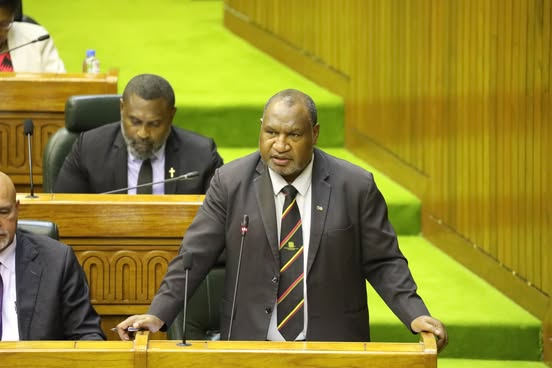Prime Minister James Marape has issued a clear and uncompromising directive to public servants in the Provinces and Districts throughout the country who fail to abide by Reporting requirements that they will face serious disciplinary action, including termination.
In his strong Statement to Parliament this week, the Prime Minister emphasized that a culture of accountability must be embedded in every level of Government, from National Departments to Provincial and District Administrations.
Adding on to his strong call following Parliament session this week, Prime Minister Marape said that failure to report is not just poor governance, it is outright negligence.
“If you are entrusted with public funds and responsibilities, reporting is mandatory, not a choice. Those who do not comply will be removed from their positions. No more carrying individuals who fail to deliver.”
Prime Minister Marape made it clear that all department heads, consular administrators, provincial administrators, and district officers must submit timely reports on work progress and financial management.
He also highlighted that the government is entering a new phase of governance, where transparency is the foundation of nation-building.
“You, as department heads or administrators in the Provinces and Districts, must report on your work. We have carried people for too long who do not report on what they are doing. That stops now.”
“If you are not reporting, you are failing in your duty, and that failure comes with consequences.”
In addition, through the presentation of a consolidated Annual Provincial Governments Performance Report for the years 2018-2022 by Minister for Provincial and Local Level Government Affairs, Soroi Eoe in Parliament, the government laid a strong foundation for enhancing the delivery of public services across the country.
He further said that a renewed call to action for all Provinces and Districts is that it is time to provide timely and detailed reports on yearly achievements and the utilization of funds allocated through the National Budget.
He emphasized that the process of reporting is far more than an administrative requirement; it is a cornerstone of good governance and an essential instrument for tracking progress at all levels of Government.
Moreover, he also reinforced strict Deadlines for Compliance:
• Performance Reports must be submitted by 30th June each year
• Financial Reports are due by 31st March each year
“These deadlines are absolute,” Marape warned.
“No more delays, no more excuses. If you cannot meet these obligations, then you have no place in the public service.”
Meanwhile, the Prime Minister clarified that enforcement is backed by existing laws, specifically Sections 119 and 114 of the Organic Law on Provincial and Local-Level Government:
• Section 119 mandates administrative and performance reporting
• Section 114 governs financial transparency
He further stressed that the previous governments have struggled with accountability, leading to weak oversight and inefficient service delivery.
He also pointed out that since the 1995 Provincial Government Reform, only three Ministers of Government (Provincial and Local Level Government Affairs) have tabled such reports that Minister Eoe has presented in Parliament this week, while under 40% of Provincial Governments have met their reporting obligations.
“This chronic failure has continued for decades. But today, we are drawing a line in the sand. If you do not report, you will be removed because accountability is not optional.”
With Papua New Guinea approaching its 50th year of Independence, Prime Minister Marape sees these reforms as critical to modernizing governance and strengthening public trust.
“This is not just about paperwork. This is about delivering results for our people, ensuring every kina spent is accounted for.”
“We are restructuring our governance systems so that PNG enters its next chapter with integrity and efficiency at the core.”
Furthermore, PM Marape called on all leaders to support these reforms, emphasizing that good governance transcends political affiliations.
“This is a bipartisan issue. Transparency is not a political debate, but it is our responsibility as leaders.”
“Every public servant must step up and deliver. Those who cannot meet the standard will be removed.”
“We have learned from past mistakes, and now we are implementing robust mechanisms to ensure reporting is enforced and who fail will face termination, because non-compliance is a betrayal of public trust. We will not allow this cycle to continue.”
With strict reporting measures now in place, the Marape-Rosso Government aims to restore transparency, strengthen public sector integrity, and ensure Government efficiency across Papua New Guinea.

